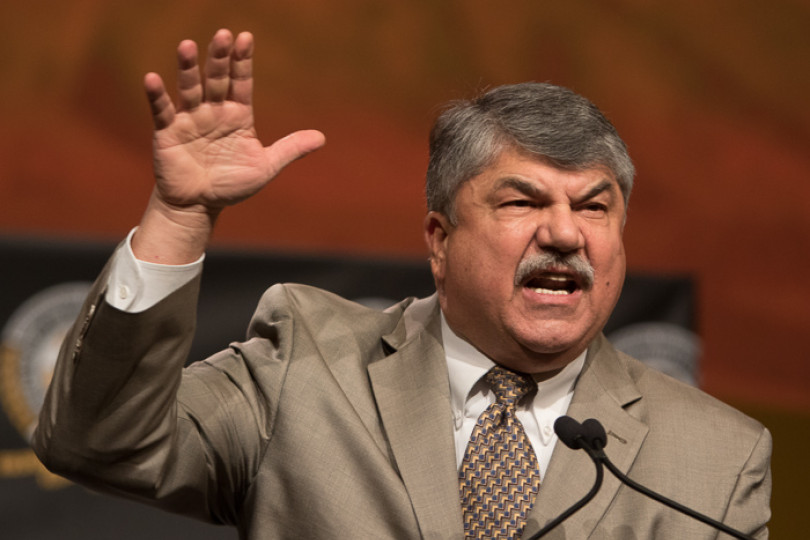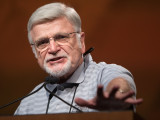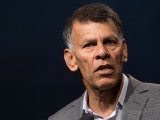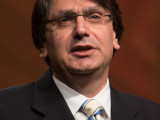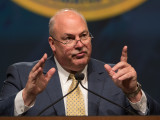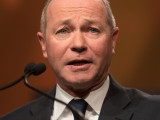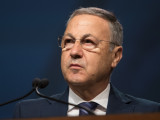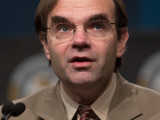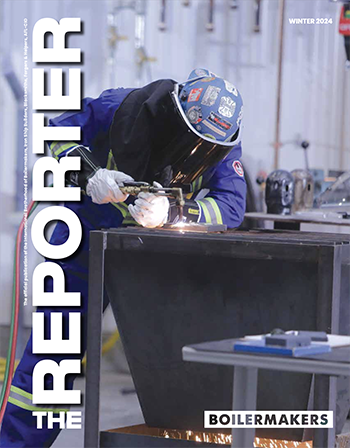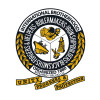RICHARD TRUMKA, AFL-CIO President
View Photo Gallery (10 photos)
"Lone Survivor" SEAL relates life story, struggles
A NAVY SEAL, labor leaders, and an industrial entrepreneur inspired and informed Boilermaker delegates throughout the convention. The guest speakers criticized trade deals that hurt the global working class; condemned the practices of the ultra-rich and greedy corporations; praised the Bank of Labor; and stressed the need for the development of carbon, capture, use and storage. A common theme throughout the week was the need for solidarity among those fighting for the rights of workers across the globe.
Keynote speaker Marcus Luttrell, a retired U.S. Navy SEAL, told the story of his childhood, his special relationship with his twin brother, and his experiences and lessons learned while growing up and serving in the military. Luttrell said he was "born common," and that reality forced him to acquire the discipline and skills he needed to excel.
Following SEAL training, Luttrell served in Iraq and later in Afghanistan, where he took part in an especially dangerous mission with teammates in SEAL Team 10 to capture or kill a high-ranking Taliban leader. The mission ended in a firefight that left all three of his team members dead and him severely wounded, an event that formed the basis of the book and movie, "Lone Survivor."
Luttrell said that courage during training and on the battlefield didn't come naturally to him; it took practice. He told delegates that in life "anything is possible if you just work at it."
United Mine Workers of America International President Cecil Roberts gave a fiery address, drawing on his background as a coal miner to describe the plight of the working class in a nation where unions are under attack, the middle class is shrinking, and the divide between the ultra-rich and everyone else continues to grow.
"They tell us America is a nation of the people by the people and for the people," said Roberts. "I submit to you &ellips; it's of the money, by the money and for the money." He said government needs to work for the people and outlined a five-point plan for change, first demanding a trade deal that protects American workers instead of hurting them.
Roberts called for working Americans to be paid a living wage, not a minimum wage; an end to discrimination in all of society; and single-payer health care for every citizen of America. Lastly, he insisted government "give us back our God-given right to belong to the union we choose."
AFL-CIO President Richard Trumka praised the Boilermakers' vision and activism concerning responsible stewardship of union financial resources, and spoke of the importance of the Bank of Labor. "Sometimes we run across people who don't understand why we have a bank," he said. "Money is just like anything else. It can be organized as a tool for us, or a weapon against it. When we don't use it as a tool, our enemy uses it to beat us down."
Trumka criticized the politics of the one percent, and blasted the corporations that shipped American jobs overseas because of tax policies and trade deals. He said for years Wall Street and the Washington elite have tried to paint labor as against trade, but it's not. "What we refuse to do is allow another trade deal to be shoved down working people's throats."
Trumka said that working Americans deserve a bigger piece of the pie and they can't quit fighting to get it. "It's up to us to change things. We'll fix what's broken. We'll heal through solidarity. Together we'll create a better tomorrow," he said.
Canadian Labour Congress President Hassan Yussuff spoke about the Canadian Labor Movement's recent gains and its current battles. He said the election of Prime Minister Justin Trudeau, leader of the Liberal Party, was a significant win for the CLC. Other positive changes included a 2015 Supreme Court ruling giving Canadians the fundamental right to strike and another ruling declaring workers have the right to choose a union free of intervention.
Yussuff said the CLC was engaged in battles involving onerous public reporting rules, the job-destroying Trans Pacific Partnership trade deal, banning asbestos mining and a favorable temporary worker program.
Yussuff called for solidarity between Canadian and U.S. labor. "There may be a border that separates us," he said, "but as working people there is no separation."
Union Labor Life Insurance Company CEO Edward Smith stressed the importance of the Bank of Labor, and the Boilermakers' advocacy for carbon capture, use and storage (CCUS).
Smith said when a Boilermaker's money — or any union member's money — goes to an institution that invests its profit in ways that harm labor, that gives away labor's power. "We cannot let them own our money. They've got enough billions without us giving them our money &ellips; to help destroy our union, our Labor Movement and in effect, our country." Smith said that's why he was excited to hear about the plan of International President Newton B. Jones to grow the Bank of Labor from a small Midwestern bank to an international institution.
Smith noted that Boilermakers are championing the development of viable CCUS technology and said Ullico is committed to figuring out how to finance CCUS research and development.
Assistant General Secretary of IndustriALL Kemal Özkan called for labor organizations across the globe to defend the rights of workers. IndustriALL was established four years ago with the objective of organizing and building the collective power of workers around the world and promoting and defending their rights against the increasing attacks from employers and governments.
He stressed the need to work together in protecting workers' rights to form collective bargaining agreements. "In today's globalized world, we need to work together, across borders, to secure the rights of every worker to join a union, to get the protection of a collective agreement giving living wages, and guarantee safe workplaces," he said.
"We need a strong global union. We need a strong Brotherhood of Boilermakers. We need a strong IndustriALL," he said.
The Chairman of North West Upgrading, Ian MacGregor, related his journey into the business of clean energy, including the positive impact of carbon capture, use and storage, and the leadership of the Boilermakers in advancing CCUS.
MacGregor is constructing the first refinery to be built in Canada in three decades. The $8 billion project is also the first refinery designed with an integrated system to capture carbon dioxide produced during the refining process.
He said industry needs to get a handle on controlling CO2 emissions. "If we don't do something about it, we're all going to go out of business. So we have to figure out what to do." He said Boilermakers are the logical leaders in this effort. "You're on every project. You know the owners, and you're organizing."
Robbie Hunter, President of the State Building and Construction Trades Council of California, outlined the gains made in California, through cooperation with Boilermakers and other construction trades, to secure passage of Senate Bill 54. Before passage of the bill, refineries on the West Coast were flooded with unskilled, out-of-state workers bussed into California, Hunter said, taking jobs from skilled workers, creating an unsafe work product and "enslaving workers in the industrial sector."
To pass the bill, the consortium of unions fought against refinery owners, Steelworkers and others. "It was a war," said Hunter. "The Steelworkers flooded the capitol."
The eventual passage of the bill has improved safety at refineries for workers and the communities where the facilities are located. It has also increased opportunities for trade workers and contractors, and increased wages.
"I want to thank the Boilermakers, because they were the column that [supported SB 54]," said Hunter.
Carlo De Masi, Secretary-General of the Italian Federation of Electrical Utility Workers (FLAEI), and a member of the board of the Italian Confederation of Labor (CISL) spoke about the Bank of Labor, global energy, and the need for solidarity across continents.
Traditional banking in Europe is suffering, and workers and their families are worried about the future, said De Masi, who noted that the Bank of Labor could be a mechanism to promote workers' interests. He said he is open to exploring a future relationship between the bank and FLAEI-CISL, and the possibility of expanding the Bank of Labor into Europe.
The vilification of coal-fired power plants has hit Italian workers as well as working families across North America. "In Italy, we are looking at 60 plant closings and the loss of thousands of jobs," said De Masi. He called for governments across the globe to invest money to develop carbon capture, use and storage technologies.
Michael Hayes, Director of the Office of Labor-Management Standards at the Department of Labor, spoke about the DOL's new "persuader rule." The rule requires employers who hire union-busting consultants, and the consultants themselves, to file reports on their indirect activities (such as planning captive audience meetings with employees or writing anti-union talking points on behalf of the employer). Previously, a report only had to be filed in situations where the consultant had direct contact with employees.
Hayes said that the main purpose of the rule was to give employees who are considering whether to join union information about any third party that has been hired to dissuade them from organizing.
"We thought that it was right that [employees] should be able to access information about the anti-union messages that they are repeatedly hearing and seeing," said Hayes. "Opponents of unions are willing to spend a lot to bust unions and don't have to report, but unions have to report dollars spent on organizing."
